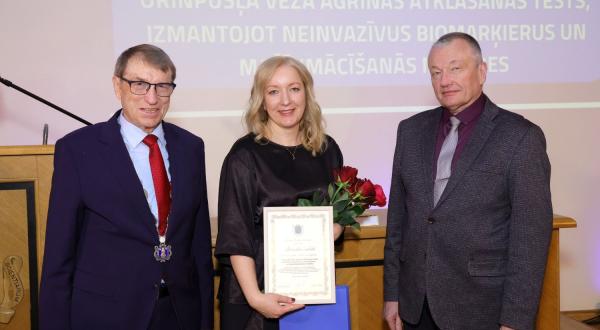RSU Tops University Reputation Rankings in Latvia for Fifth Year!
For the fifth year in a row, an annual study conducted by the research company Kantar has recognised Rīga Stradiņš University (RSU) as being the Latvian institution of higher education with the best reputation. Respondents valued how highly diplomas from RSU are rated in the labour market, the high quality of education and being able to learn the practical knowledge and skills required to work in their specialty.
After rising in the reputation index significantly among the general Latvian population last year, RSU has managed to maintain the same level this year at 77 index points. Moreover, the university’s reputation has increased by two points among youth this year and now lies at 82. Compared to the overall reputation of the Latvian higher education sector, RSU’s reputation is also much higher this year and significantly exceeds the sector average in both age groups (at 59 and 62 index points, respectively).
‘Leading in this field for five consecutive years is not an accident. The fact that we can retain first place in the reputation rankings among Latvian institutions of higher education in the long-term, proves the high quality of studies and research at RSU. We are very pleased that young people have noticed our strongest asset – that a diploma from RSU is valued highly in the labour market.’
RSU Rector Prof. Aigars Pētersons
This is also affirmed through monitorings of graduates from higher education institutions that the Ministry of Education and Science has carried out. 92% of RSU graduates enter the labour market successfully, while the average employment rate of Latvian university graduates is 80%, according to data published this year. It’s important that RSU supports simulation-based studies in both medicine and other fields like communications, law, politics and entrepreneurship when preparing new specialists for the labour market.
The social sciences study programmes that RSU has implemented have become more popular over the last year. The best-known study programmes are communication science and law, whereas among young people it is business, economics and management. There is an increase among the general population, including young people as a separate research group, of how highly scientific activity at RSU, as well as the university’s infrastructure (premises for study and research, as well as student hostels) is rated.
In general, this most recent study on Latvian universities’ reputation maps a positive trend in several categories – people value education as an important step in their professional and personal growth. Data shows that over the last few years, 50% of all respondents invested in continuing- and interest-based education, including 45% of the young people surveyed. Latvian citizens have attended continuing education courses primarily at specialised educational institutions, but young people have relatively more often attended such courses at Latvian higher education institutions.
At the same time, the Kantar study highlights a trend where people don’t stop at the level of education they have achieved. Almost a fifth of young people (19%) and 8% of the general public plan to start their master’s studies within the next three years. As their motivation, respondents have indicated a desire to increase their competitiveness in the labour market and adapt to a changing world.
Compared to 2020, the number of applicants considering studying outside Latvia has not increased. A quarter of all current, or prospective students are still considering studying abroad, most often in a European country outside the Baltic States. It should be noted that interest in studying abroad has not changed a lot in the last year, but the share of the population considering studying at an Estonian university has decreased significantly.
The research company Kantar conducted the study on reputation in March and April of this year, surveying more than 1,000 Latvian citizens aged 15–60, with a target subgroup aged 15–26 (this is a representative sample of the general population in the given age group).
Related news
 RSU research project on early diagnosis of bladder cancer receives recognition from the Latvian Academy of SciencesRecognition, Research, Innovation
RSU research project on early diagnosis of bladder cancer receives recognition from the Latvian Academy of SciencesRecognition, Research, Innovation



